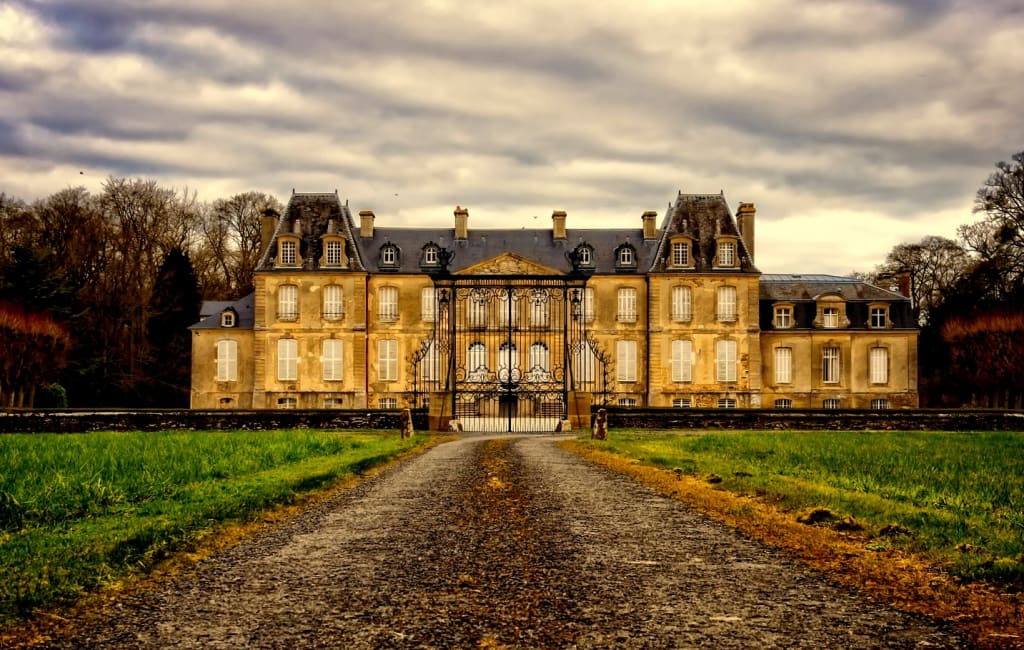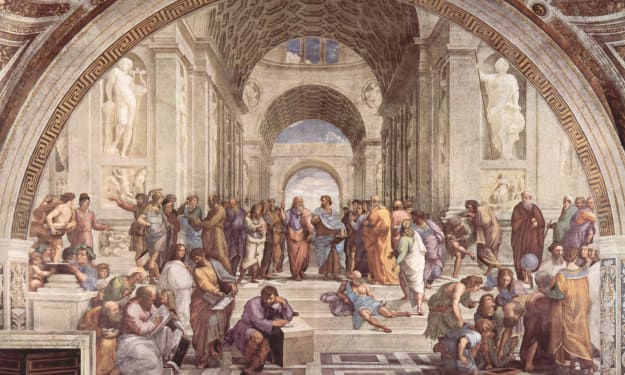The Lord of Sudmoor Hall
England, 1964

I stood at the window and looked out at what had lately been my father’s estate. The sprawling park, the stables, the manicured gardens, the ponds and fountains—they were all mine now, though nothing was official. Not yet. But it was mine all the same, the estate, the house, the investments—everything that came with Sudmoor Hall. My brothers didn’t know it yet. But I did. It was destined to pass to me, as the eldest son. Flushed with contentment at the thought, I ran my eyes over this one small corner of the Earth that belonged to me and me alone. The trees were dead and spindly with the winter (an especially cold one), and all the ponds and fountains were frozen. One of those ponds in particular, guarded by a great, barren elm tree, demanded my constant attention. I just stood at the window… staring at that pond, while the others talked behind me.
Shaken from my thoughts, I heard the voice of my father’s butler. No, my butler. Faithful Cripps. “My Lord?” he said.
I turned and smiled at the old man. “Yes, Cripps?”
“Sir Jeffery has arrived from London. I’ve shown him to his room.”
“Yes, very good, Cripps,” I replied, turning my back to the window, my attention now fixed on my visitors. Two men from Scotland Yard had arrived, with new questions. I addressed the lead inspector contritely. “My apologies, sir,” I began. “My mind has a tendency to wander during this difficult time. You were saying?”
This inspector, one Reginald Pratt, sporting an absurd handlebar mustache, cleared his throat and repeated himself. “I had asked whether your father was known to have any… forgive me, any… uh… dalliances?”
I feigned offense. “That borders on impertinence, sir.”
Pratt shrank, as I knew he would. “I’m sorry, Lord Robert,” he muttered. Then, with a renewed sense of conviction, he added, “But in light of the circumstances, I must ask such things. Any information, pertinent or otherwise, will assist us in solving the disappearance of Lord Crombie.”
Pratt’s lackey, a Mr. John Lynch of Surrey, no doubt new to the Yard, spoke up at this point. “If there was a history with women… we would, of course, say nothing of it.” He had the red hair of the Irish. There was Celt somewhere back in the man’s heritage, no doubt.
I lit the cigar which I’d previously been fingering in my hand for the last ten minutes and walked away from the window toward the far side of my father’s library. No, my library. It was as masculine a room as you could want. Mahogany paneling, Persian rugs, a large Gothic fireplace, antlers on the walls, and row after row of old books. “Gentleman,” I began. “I am as eager as you to know the whereabouts of my honorable father, and I’m all for helping you in any way I can. But this talk of women and dalliances. It’s bloody nonsense. Lord Crombie, as you no doubt know—” (I almost said “was” here, but I caught myself) “is a Christian man of good virtue. I assure you that his disappearance has naught to do with any scheming female. Oh, that’ll be all, Cripps.”
I watched the butler retreat obsequiously as Pratt sighed. “I thought not,” the inspector said. “But I had to ask.”
I smiled, sitting in my father’s leather armchair. No, my leather armchair. “Of course.”
Lynch consulted his little notepad. “You have two brothers, sir?”
“I do, yes.”
“And where are they currently?” Pratt inquired.
I suspected they knew exactly where my brothers were, but I humored them all the same. “Thomas is en route to Sudmoor presently. We expect him on the seven o’clock train. Patrick left for America a week ago. As you may know, he’s an attaché at the embassy in Washington.”
“We did know that, yes,” Pratt confirmed.
Of course they did. I worked on the cigar and now felt the need for small talk. I grunted loudly, then said, “Patrick had the dubious fortune of meeting President Kennedy last year, the poor chap. That business in Dallas was savage. Of course, it would never happen here, mark you. The British royalty elicits too much respect in the world to die by some assassin’s hand.”
“Charles the First notwithstanding,” Lynch offered.
“Well, yes, there is that. The work of the people, though, and not that of a rogue.”
Lynch nodded. “True.”
Pratt seemed like he wanted to say something. He hesitated, then spoke: “Sir, we have already spoken to the servants.”
I blew smoke out and played along. “Well, yes, I should’ve thought so.”
“Several of them… a Mrs. Nugent—”
“Our head cook, yes.”
“—in particular, says you were seen on the night of Lord Crombie’s disappearance walking on the grounds in your nightshirt.”
That damn cook. She was always trouble for me. Why didn’t she sleep at night like normal people? “Well… yes,” I answered. “Of course. After I awoke to the commotion downstairs, as I earlier indicated, and found my father missing, I naturally went out into the night to see what I could make out of the ghastly business.”
Pratt nodded. “Of course. Of course. Was that before or after you asked Mr. Cripps to investigate?”
“Pardon?”
“The ruckus that woke you. You said earlier that you sent your butler to find out what it was.”
“Oh, yes. After.”
“I see.”
Lynch decided to chime in now, making a show of checking his notes, as though he was unsure: “And it was that selfsame butler, Mr. Cripps, that alerted you to the absence of Lord Crombie?”
“Yes, it was.”
“And what did Cripps say, exactly?”
I flushed with irritation at this cross-examination. They were digging, no doubt. “Cripps informed me that my father’s bedchamber had been ransacked and that Lord Crombie was, as far as he could tell, not on the premises.”
Pratt raised an eyebrow. “Your estate is over two hundred acres, is it not?”
“Two hundred and seven.”
“Wasn’t it a bit premature, then,” Lynch put in, “for your man to declare your father as being, ‘not on the premises?’”
“Well, as I stated, I too searched the grounds.” I threw a quick glance to the window and the pond beyond. Had they noticed?
“Not the entire grounds, surely.”
“Of course not,” I concurred, vexed. “Your team conducted a thorough search of the park, inspector. Did they find anything?”
Pratt and Lynch both shook their heads. “No,” the former admitted.
“Well then, what exactly are you driving at?”
“Lord Robert…” Pratt began. Then, evidently deciding to change tactics, he rubbed his chin and said, “We understand that the solicitor for the Crombie estate, uh—” he consulted his own little pad “—Sir Jefferey Talbot, has arrived from London. Are you aware that your father met with Sir Jefferey on the seventh of January? Four days ago.”
I did know this. But I of course pretended otherwise. “Why, no. No, I was not aware.”
“Then you can’t shed any light on what that meeting entailed?”
I bristled, slightly. “If I was unaware of the meeting, inspector, I couldn’t very well provide any details on what was said or done there.”
Pratt bowed his head. “You’re right, of course.”
“Anything else?”
Pratt cast a quick glance out the window, then walked toward me. “Yes, one last question, sir.”
“Of course.”
“Are you concerned about your father’s whereabouts?”
This took me aback. I studied the plebian inspector for a moment, then replied, “I’m not sure what sort of question that’s meant to be.”
“Forgive me, Lord Robert. I’m only observing that for a man whose beloved father has gone missing, you don’t seem too, uh, affected by it.”
“Affected?”
“Disturbed. Emotionally.”
I scoffed incredulously, standing up to face the fool head on. “Emotion? Inspector Pratt, I do not know what sort of soft squealers your mother raised, but I assure you that in this house, we are Englishmen.”
“My apologies, Lord Robert, I meant no offense.”
“Emotion,” I repeated. “Is that what Scotland Yard has been reduced to?”
Lynch chuckled nervously. Pratt said nothing.
By now I was rather tired of their company. “Will that be all, gentlemen?”
Again, Pratt said nothing. He only stood watching me for a while. I couldn’t guess his thoughts. But Lynch tugged Pratt’s arm and the moment passed. “Yes, Lord Robert. That’s all for now.”
I wanted to tell him that it wasn’t “Lord Robert” anymore. It was now “Lord Crombie,” though I couldn’t say so, obviously. Not until my father was officially declared deceased. All in good time.
As the two men made to leave, I addressed them in a commanding tone. “Find my father, gentlemen. Find Lord Crombie and you shall be rewarded handsomely.”
Pratt again made no reply, but Lynch, before leaving the room, tipped his hat. “We’ll do our best, sir,” he assured me.
And with that, they were gone. The sudden emptiness of the room came home to me like an old friend, and but for the ticking of the grandfather clock in the corner and a crackling fire in the hearth, all was silent.
Pratt suspected me. I know he did. He had the sharp mind and astute intuition you sometimes find in the lower classes. But without evidence, his suspicions were no more to me than wisdom to a fool. At worst, he would prove to be a minor annoyance, but certainly not a significant threat. And Lynch was little more than a lap dog. I felt confident I could run circles around both of them.
I stamped the cigar out in the ashtray on the big pine desk. Father’s desk. No, my desk. Sufficiently pleased with the situation, I poured a scotch and congratulated myself on my ingenuity. All I had to do now was get the lawyer in line. Fortunately, I knew the old man’s weakness. Sir Jeffery had a lover. A male lover. And when it comes to the father of a M.P., you can’t find a better bargaining chip than that. I would use that information, if I had to. I’d paid too much for it not to.
I chuckled, remembering how I’d promised Pratt and Lynch a reward if they found my father. A nice touch, that. It’s easy to pledge money when you know you’ll never have to pay. They wouldn’t find Lord Crombie. Oh, no. He was in a quite secure place.
Downing the scotch, I again crossed the room and went back to the window, eying the pond beneath the elm tree. It was frozen solid. Anything resting at the bottom of that pond wouldn’t and couldn’t be found until the spring thaw.
A light snow was falling now. My butler appeared at my side. “You did well, Cripps,” I said.
“Do they suspect anything, my Lord?”
“Almost certainly. That inspector has the clever wit sometimes found amongst the peasantry. Thank heavens you’re not burdened by that malady.”
“Yes, thank heavens.”
I again cast my eyes toward the pond. “It’s almost over, Cripps. We’re in the clear at least until spring. At that point, we’ll have to get… creative.”
“Mr. Jacoby has some ideas on that score.”
Jacoby, the ancient gardener at Sudmoor. How quickly he betrayed his master of fifty years. Money is power, though what that old man could want with five thousand pounds was beyond me. “I’m sure he does,” I remarked. “But make sure he keeps quiet about it. That one has a tendency to jabber. Oh, and Cripps? Keep an eye on Mrs. Nugent. She might be trouble.”
“Yes, my Lord. Will you be needing anything?”
“Tea for two, Cripps. And show Sir Jefferey to the library.”
“Yes, sir.”
As old Cripps bowed and turned to leave, I called after him. “This has all been for the best, you know.”
Cripps said nothing. He merely nodded and left. He was an excellent butler.
About the Creator
Michael Vito Tosto
Michael Vito Tosto is a writer, jazz musician, philosopher, and historian who lives in St. Louis, Missouri with his wife and two cats. A student of the human condition, he writes to make the world a better place.
www.michaelvitotosto.com






Comments
There are no comments for this story
Be the first to respond and start the conversation.